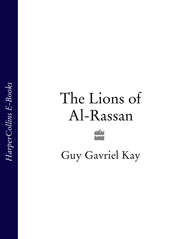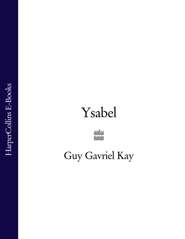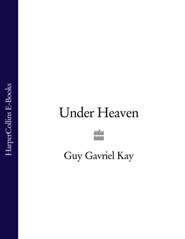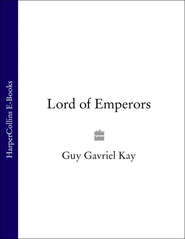По всем вопросам обращайтесь на: info@litportal.ru
(©) 2003-2025.
✖
A Song for Arbonne
Автор
Год написания книги
2019
Настройки чтения
Размер шрифта
Высота строк
Поля
But he wouldn’t raise the alarm. Bertran and Soresina had counted on that, he knew. It angered him, the easy assumption that his behaviour could be anticipated, but he wasn’t enough provoked to change his mind simply to spite them. People died when spite like that was indulged.
His head was hurting at back and side both, two sets of hammers vying with each other to see which could cause him more distress. The seguignac helped though; seguignac, he decided sagely, wiping at his mouth, might actually help with a great many matters of grief or loss.
He turned to the duke to say as much, but stopped, wordless, at what he saw in the other’s unguarded face. The scarred, ironic, worldly face of the troubadour lord of Talair.
‘Twenty-three years,’ Bertran de Talair said a moment later, half to himself, his eyes on the moon in the window. ‘So much longer than I thought I would live, actually. And the god knows, and sweet Rian knows I’ve tried, but in twenty-three years I’ve never yet found a woman to equal her, or take away the memory, even for a night.’
Feeling hopelessly out of his element in the face of this, Blaise felt an unexpected moment of pity for Soresina de Baude, with her unbound hair and her white silk night robe in the room above them. Unable to summon any words at all, suspecting that none that he could even think of would be remotely adequate to what he had just heard, he simply reached back across the stairway and offered the seguignac.
After a moment En Bertran’s ringed hand reached out for it in the moonlight. De Talair drank deeply, then he drew the stopper from some recess of his clothing and capped the flask. He rose slowly, almost steady on his feet and, not bothering with another candle, started down the winding stairway without another word or a glance back. He was already lost to sight in the darkness before the first curve took him away. Blaise heard his quiet footsteps going down, and then those, too, were gone and there was only silence and the moon slowly passing from the narrow window, leaving behind the stars.
CHAPTER III
Ademar, king of Gorhaut, slowly turns away from the diverting if extremely messy struggle taking place in front of the throne between the carefully maimed hound and the three cats that have been set upon it. Not even acknowledging the half-clothed woman kneeling on the stone floor in front of him with his sex in her mouth, he looks narrowly over at the man who has just spoken, interrupting this double amusement.
‘We are not certain we heard you correctly,’ the king says in his unexpectedly high voice. The tone however is one his court has come to know well in little over a year. Not a few of the fifty or so men assembled in the audience chamber in the king’s palace at Cortil offer silent thanks to Corannos that they are not the recipients of that gaze or that tone. The handful of women present might have different thoughts, but the women do not matter in Gorhaut.
With an elaborate casualness that fools no one, Duke Ranald de Garsenc reaches for his ale and drinks deeply before answering. To his credit, the more attentive eyes among the court note, de Garsenc’s hand is steady as he sets the heavy flagon down again. Looking across the wooden trestle table at the king, he lifts his voice. ‘I understand you were talking about Arbonne this morning. I simply said, why don’t you marry the bitch? She’s a widow, she’s heirless, what could be simpler?’
The king’s extremely large, ringless hands descend absently to first loop themselves in the long black hair and then to briefly encircle the ceaselessly working throat of the girl on her knees in front of him. He never actually looks down at her though. Beyond her, the old hound has now fallen; it is lying on one side panting raggedly, blood streaming from a great many wounds. The cats, starved for five days, are avidly beginning to feed. Ademar smiles thinly for a moment, watching, and then makes a sudden moue of distaste as the dog’s entrails begin to spill onto the floor. He gestures, and the handlers spring forward to seize the four animals and bear them from the room. The cats, ravenous and deranged, make high-pitched shrieking sounds that can be heard even after the doors at the far end have closed behind them. The smell of blood and wet fur lingers, mixed with stinging smoke from the fires and spilled beer on the tables where the high lords of Gorhaut are permitted by ancient custom to sit and drink in the presence of their liege.
Their liege closes his eyes at just that moment. His large, well-knit body stiffens and an expression of pleased surprise crosses his fair-skinned, full-bearded features. There is an awkward silence in the room as courtiers see reason to scrutinize their fingernails or the dark beams of the ceiling. With a sigh, Ademar slumps back on the throne. When he opens his eyes again it is to look, as he always does when this particular amusement reaches its climax, at the women of his court, gathered near the windows to the left of the throne. The more discreet among them are looking assiduously down and away. One or two are visibly discomfited. One or two others are equally flushed, but for what seem to be different reasons, and these are the ones whose eyes gaze boldly back at Ademar’s. Screening the king’s lower body with her own, the kneeling woman attends to the points and drawstrings of his garments and carefully smooths his breeches and hose before tilting her head up for permission to withdraw.
Slouching back in his throne, Ademar of Gorhaut looks down at her for the first time. With an indolent finger he traces the contours of her lips. He smiles, the same thin smile as before. ‘Attend to the duke of Garsenc,’ he says. ‘My father’s former champion seems a man sorely in need of the ministrations of a proper woman.’ The girl, expressionless, rises and paces gracefully across the floor towards the man who had interrupted the king’s pleasure a moment before. There is a ripple of coarse laughter in the room; Ademar grins, acknowledging it. Beside the window one woman turns away suddenly to look out over the misty grey of the landscape. Ademar of Gorhaut notices that. He notices a great deal, his court has come to realize in the short period of his reign.
‘My lady Rosala,’ the king says, ‘turn not away from us. We covet the sunshine of your countenance on a day so dreary as this. And it may be your husband will be well pleased to have you learn a new skill as you watch.’
The woman called Rosala, tall, yellow-haired and visibly with child, delays a long moment before obeying the command and turning back to the room. She nods her head formally in response to the king’s words but does not speak. The other girl has by now slipped under the long table and can be seen settling herself in front of Duke Ranald de Garsenc. The duke’s colour is suddenly high. He avoids looking towards the side of the room where his wife stands among the women. A few of the lesser courtiers, bright-eyed with amusement and malice, have strolled over to stand by his shoulder, glancing downwards with an intense simulation of interest at what is now taking place beneath the table. Ranald stares straight ahead, looking at no one. This amusement of the king’s has taken place before, but never with a lord of so high a rank. It is a measure of Ademar’s power, or the fear he elicits, that he can do this to a man who was once King’s Champion in Gorhaut, however many years ago that was.
‘Marry the bitch,’ the king repeats slowly, as if tasting the syllables on his tongue. ‘Marry the countess of Arbonne. How old is Signe de Barbentain now, sixty-five, seventy? An astonishing suggestion … how is she with her mouth, does anyone know?’
Several of the men and one of the women by the window titter with laughter again. None of the foreign envoys is in the room at the moment; given the current subject matter, an extremely good thing. Rosala de Garsenc is pale, but her square, handsome features betray no expression at all.
On the other side of the room her husband abruptly reaches for his flagon again. This time he spills some ale as he brings it to his lips. He wipes his moustache with a sleeve and says, ‘Does it matter? Would anyone imagine I speak of more than a marriage of acquisition?’ He pauses and glances, almost involuntarily, downward for an instant, and then resumes. ‘You marry the crone, pack her off to a castle in the north and inherit Arbonne when she dies of fever or ague or whatever else the god sees fit to send her. Then you follow through with your marriage to Daufridi of Valensa’s daughter. She may even be old enough to bed by then.’
Ademar has turned in his seat to look fully at him, his pale eyes unreadable above the yellow beard. He says nothing, chewing meditatively on one end of his long moustache. There is a stir at the far end of the room, made louder by the silence around the throne. The great doors swing open and the guards let someone through. A very large man in a dark blue robe enters, striding purposefully forward. Seeing him, Ademar’s face lights up. He grins like a mischievous child and glances quickly back at Ranald de Garsenc, who has also taken note of the man entering, though with a very different expression on his face.
‘My dear High Elder,’ the king says, his tone brightly malicious now, ‘you are narrowly in time to observe how we value our cousin, your son, and his wise counsels. Our well-beloved Mistress Belote is even now assuaging him with his lady wife’s full approval. Will you come make this a family affair?’
Galbert de Garsenc, High Elder of Corannos in Gorhaut, Chief Counsellor to the King, disdains to even glance at his son, nor does he appear to acknowledge the amusement in the room that takes its cue from the king’s brittle tone. He stops not far from the throne, a bulky, formidable presence, and inclines his large, smooth face towards Ademar, saying merely, ‘What counsels, my liege?’ His voice is deep and resonant; though he speaks quietly it fills the large chamber.
‘What counsels, indeed! Duke Ranald has just advised us to marry the countess of Arbonne, send her off north and inherit her sun-drenched country when she succumbs in her decrepitude to some lamentable pestilence. Would this be a thought you and your son have devised together?’
Galbert, the only clean-shaven man in the room, turns to look at his son for the first time as the king finishes speaking. Ranald de Garsenc, though very pale, meets his father’s gaze without flinching. With a contemptuous twist of his mouth, Galbert turns back to the king.
‘It would not,’ he says heavily. ‘Of course it is not, my liege. I do not devise with such as he. My son is fit for nothing but spilling ale on himself and occupying tavern sluts.’
The king of Gorhaut laughs, a curiously joyous, high-pitched sound in the dark-beamed, shadowed room. ‘Tavern sluts? In the name of our blessed god! What a way to speak of the noble lady his wife, my lord Galbert! The woman bearing your grandchild! Surely you do not think—’
The king stops, hilarity vivid in his face, as a flagon of ale hurtles across the room to strike the High Elder of Corannos full on his broad chest. Galbert stumbles heavily backwards and almost falls. At the long table Ranald rises, hastily pushing his semi-erect member back into his clothing. Two guards step belatedly forward but pause at a gesture from the king. Breathing heavily, Ranald de Garsenc points a shaking finger at his father.
‘Next time I might kill you,’ he says. His voice trembles. ‘Next time it may be a knife. Take note for your life. If you speak so of me again, anywhere where I might hear of it, it may mean your death and I will submit myself to whatever judgment of that deed Corannos makes when I leave the world.’
There is a shocked silence. Even in a court not unused to this sort of thing, especially from the de Garsenc clan, the words are sobering. Galbert’s rich blue robe is stained with dark ale. He fixes his son with a glance of icy contempt, easily a match for Ranald’s impassioned rage, before turning back to the king. ‘Will you allow such an assault upon your High Elder, my liege? An attack upon my person is an insult to the god above us all. Will you sit by and let this impiety go unpunished?’ The deep voice is still controlled, resonantly pitched, soberly aggrieved.
Ademar does not immediately reply. He leans back once more against the heavy wooden seat-back of the throne, stroking his beard with one hand. Father and son remain on their feet, rigid and intense. The hatred between them lies heavy and palpable in the room, seeming denser than the smoke of the fires.
‘Why,’ says King Ademar of Gorhaut, at length, his voice sounding even higher and more querulous after the High Elder’s deep tones, ‘is it such a foolish idea for me to wed Signe de Barbentain?’
Abruptly Duke Ranald sits again, a tiny smile of vindication playing about his lips. Impatiently he moves a knee to forestall an obedient attempt by the woman beneath the table to resume her attentions. On the far side of the room he notices that his wife has turned away again and is staring out the window with her back to the king and the court. It has begun to rain. He looks at Rosala’s profile for a moment, and a curious expression crosses his own features. After a moment he lifts his flask and drinks again.
The only thing I really don’t know, Rosala de Garsenc is thinking just then, looking out at the cold, steady, slanting rain and the mist-wrapped eastern moors, is which of them I despise most.
It is not a new thought. She has spent a remarkable amount of time trying to decide whether she more hates the erratic, usually inebriated man she’d been forced to wed by the late King Duergar, or the dangerously cunning, Corannos-obsessed High Elder of the god, her husband’s father. If she chooses, as today, to take the thoughts one small, very natural step further, it is easy to include Duergar’s son, now King Ademar of Gorhaut, in that blighted company. In part because she is uneasily, constantly aware that when the child she now carries is born she is going to have to contend with the king in a very particular way. She doesn’t know why he has singled her out, why her manner seems to have captivated him—goaded him, more likely, she sometimes thinks—but there is no denying the import of Ademar’s flat, pale gaze and the way it lingers on her, especially in that dangerous time of night here in Cortil after too much ale has been drunk around the banquet tables but before the women are permitted to leave.
One of the reasons, perhaps unfairly, that she despises her husband is for the way in which he will notice the king staring at her and indifferently turn away to his dice cup or his flagon. The duke of Garsenc ought surely, Rosala had thought, in the early months of her marriage, to have more pride in him than that. It appeared, though, that the only people who could arouse Ranald to anything resembling passion or spirit were his father and brother, and that, of course, was its own old, bleak story. It sometimes seems to Rosala that she has been part of their tale forever; it is hard to remember clearly back to a time when the lords of Garsenc have not trammelled her tightly about with their festering family griefs. It had been different at home in Savaric, but Savaric was a long time ago.
The wind is rising now, coming about to the east, sending droplets and then a gusty sheet of rain through the window to strike her face and the bodice of her gown. She doesn’t mind the cold, she even welcomes it, but there is a child to think of now. Reluctantly she turns away, back to the smoky, stale, crowded room, to hear her husband’s father begin to speak to the issue of forced marriages and conquest in the warm bright south.
‘My liege, you know the reasons as well as I, so, indeed does every man in this room, save one perhaps.’ The glance flicked sideways at Ranald is so brief as to carry its own measure of bone-deep contempt. ‘Even the women know my son’s folly when they hear it. Even the women.’ Beside Rosala, Adelh de Sauvan, who is venal and corrupt and newly widowed, smiles. Rosala sees that and looks away.
‘To wed the countess of Arbonne,’ Galbert goes on, his rich voice filling the room, ‘we would need her consent. This, she will not give. Ever. If she did, for whatever reason, maddened by woman’s desire perhaps, she would be deposed and slain by the assembled dukes of Arbonne before any wedding could take place. Think you that the lords of Carenzu or Malmont or Miraval would sit by and watch us so easily stake a claim to their land? Even a woman should be able to see the folly in such a fatuous thought. What, my liege, do you think the troubadour lord of Arbonne would do at such a time … think you that Bertran de Talair would stand by and let such a marriage take place?’
‘That name is forbidden here!’ Ademar of Gorhaut says quickly, leaning abruptly forward. Two spots of unnatural colour show in his cheeks above the beard.
‘And so it should be,’ Galbert says smoothly, as if he’d expected exactly that response. ‘I have as much reason as you my liege to hate that schemer and his godless, discordant ways.’
Rosala smiles inwardly at that, keeping her features carefully schooled. It was little over a month ago that de Talair’s latest song had reached the court of Gorhaut. She remembers the night; wind and rain then, too, a trembling, whey-faced bard obeying Ademar’s command, singing the duke of Talair’s verses in a voice like rasping iron:
Shame then in springtime for proud Gorhaut,
Betrayed by a young king and his counsellor.
And more, much more, and worse, in the creaking, barely audible mumblings of the terrified singer while a wind blew on the moors outside:
Where went the manhood of Gorhaut and Valensa
When war was abandoned and pale peace bought
By weak kings and sons long lost to their lineage?
Rosala can almost find a kind of warmth in her heart at the memory of the torchlit faces around her that night. The expressions of the king, of Galbert, the furtive glances that flitted about the hall from one newly landless lord or coran to another as the driving music brought the force of the words home, even in the timid voice of the singer. The bard, a young trovaritz from Götzland, had almost certainly owed his continued life to the presence in the great hall of Cortil that evening of the envoy from his own country and the undeniable importance of keeping peace with King Jörg of Götzland at this juncture of the world’s affairs. Rosala had no doubt what Ademar would have liked to do when the music ended.
Now he leans urgently forward again, almost rising from the throne, the two bright spots vivid in his cheeks and says, ‘No man has as much reason as we do, Galbert. Do not exalt yourself.’
The High Elder gently shakes his head. Again the rich voice encompasses the room, so warm, so caring, it can so easily deceive one into thinking the man is profoundly other than he is. Rosala knows about that; she knows almost everything about that by now.
‘It is not in my own name that I take umbrage, my liege,’ says Galbert. ‘I am as nothing, nothing at all in myself. But I stand before you and before the eyes of all those in the six countries as the voice of the god in Gorhaut. And Gorhaut is the Heartland, the place where Corannos of the Ancients was born in the days before man walked and woman fell into her ruin. An insult to me is a blow delivered to the most high god and must not be tolerated. Nor will it be, for all the world knows your mettle and your mind in this, my liege.’











